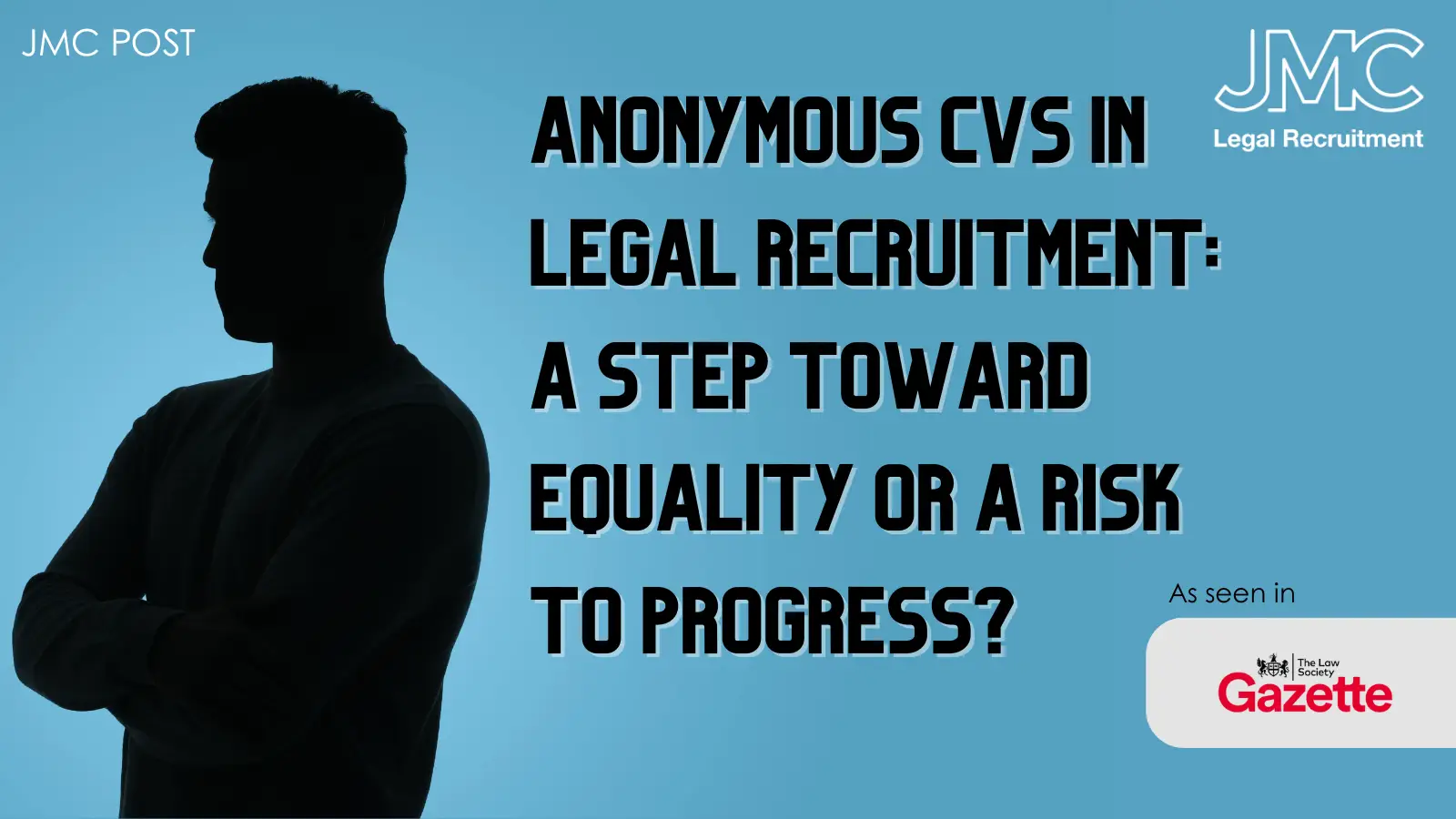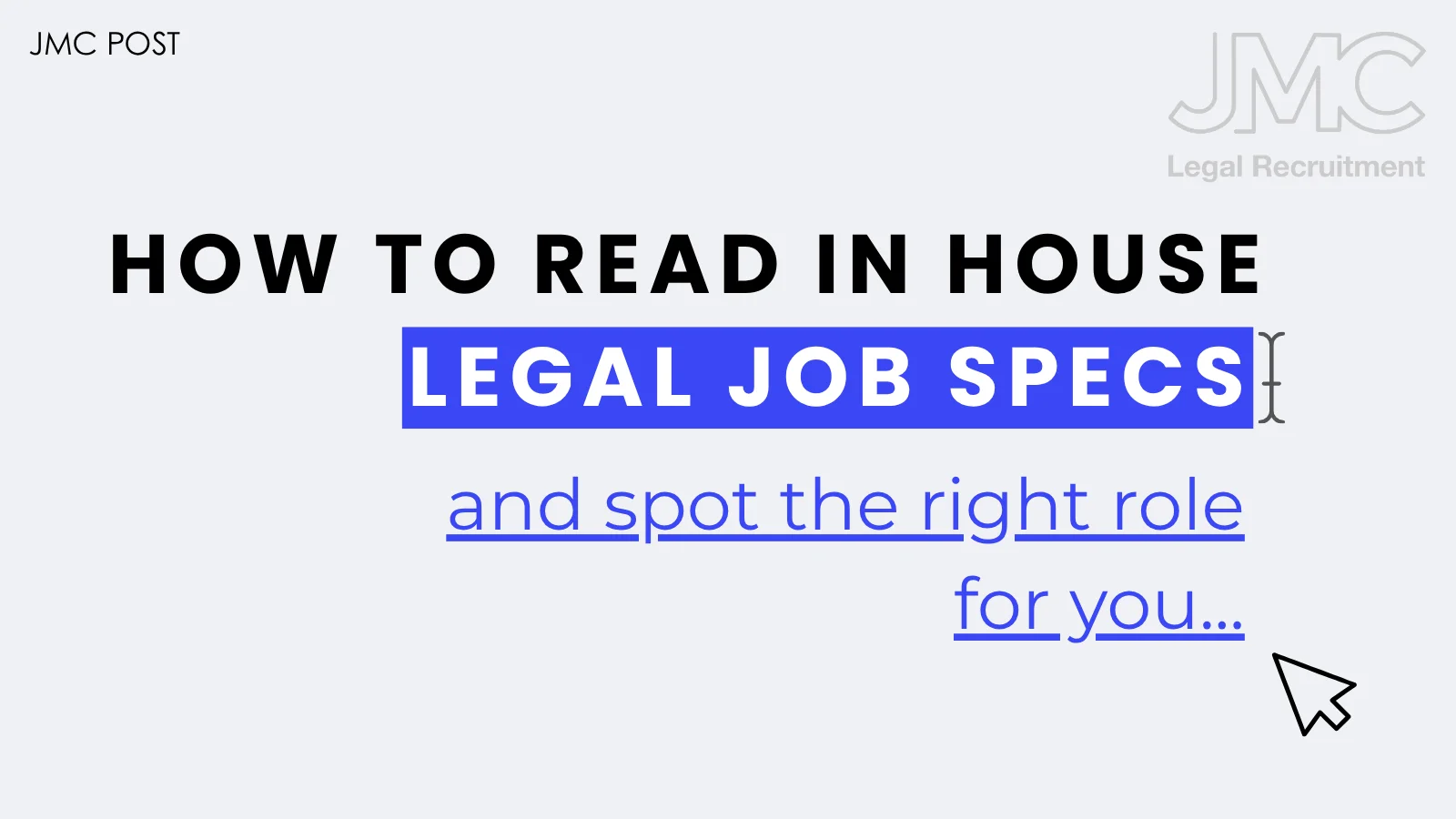
Anonymous CVs in Legal Recruitment
15 Jul, 20255 minutes
Anonymous CVs in Legal Recruitment
A Step Toward Equality or a Risk to Progress?
The topic of anonymous CVs is gaining significant momentum in legal recruitment conversations, particularly as law firms continue to face scrutiny over their diversity, equity, and inclusion (DE&I) practices. The idea is simple in principle: remove identifiable details such as name, gender, age, ethnicity, education history, and sometimes even employment history to allow candidates to be judged solely on their experience and skills.
But as anyone working in legal hiring will tell you, very little about recruitment is ever truly simple in practice.
As the CEO of a legal recruitment firm that works closely with law partners and senior legal professionals, I’ve seen both the potential and the limitations of anonymous hiring practices. While I fully support any effort that helps level the playing field, I also believe we need to pause and ask: what are we gaining, what are we losing, and is this approach genuinely suited to the realities of our profession?
The Promise of Anonymous Hiring
There’s no question that unconscious bias exists and that it plays a role in shaping career outcomes, particularly for those from underrepresented backgrounds.
A now-famous study conducted by the UK government found that job applicants with “white-sounding” names were 80% more likely to receive a callback compared to identical applicants with ethnic-sounding names. The BBC, in its own investigation, found that Muslim-sounding names received far fewer responses than traditional English names for equally qualified candidates.
It’s a sobering reality. And one that has prompted employers to look more seriously at the structures underpinning their recruitment processes.
The logic behind anonymous CVs is that by removing identifiers, you remove opportunities for bias, conscious or not, to creep into decision-making. And it’s an approach that seems to work, at least at the early stages of the recruitment funnel. According to the CIPD, 46% of organisations that adopted anonymous recruitment reported a measurable improvement in the diversity of their shortlists.
Within the legal sector, where diversity gaps remain persistent, this approach can feel both urgent and necessary.
Did you know?
- Only 23% of partners in UK law firms identify as from an ethnic minority background.
- Women still account for fewer than one-third of partners in the top 100 law firms, despite making up over 60% of trainee solicitors.
- Just 8% of legal professionals disclose a disability despite disabled people representing 20% of the UK’s working-age population.
Clearly, something needs to shift. Anonymous CVs present an appealing, low-friction solution to help firms address that imbalance, and they signal a commitment to fairness at the very first stage of interaction.
But that’s where the simplicity ends.
What We Risk Losing
As someone who has reviewed thousands of CVs and worked with firms and candidates at every level, I have a genuine concern about what is lost when we strip away too much context.
Legal recruitment, especially at the mid to senior level, is not just about qualifications or neatly formatted bullet points. It’s about assessing potential, evaluating leadership, understanding a lawyer’s journey, and placing that within the broader commercial and cultural context of the firm they’re being considered for.
Here’s the problem: potential doesn’t always show up in a vacuum.
If we remove indicators like where someone trained, what challenges they overcame, or the trajectory of their career, we often remove the very evidence that speaks to resilience, ambition, and growth. And those are the qualities law firms say they want more of.
Let me give you a few examples:
A candidate who went to a non-Russell Group university and secured a first-class degree may have overcome significant barriers; financial, cultural, or otherwise. That’s the kind of grit and determination most firms admire. But if the university name is stripped away in an attempt to ‘level the field’, that context is lost.
A lawyer who has worked at a regional or high street firm but is billing at an elite level may be outperforming peers with access to far greater resources. Without the firm name or practice context, that performance could look average.
Someone who took time out to care for a relative or recover from illness might have developed leadership, empathy, and time-management skills far beyond the norm. But on an anonymous CV, a career gap is just a blank space.
The result? You may unintentionally create a sterile and stripped-back profile that makes it harder, not easier, to appreciate the richness of a candidate’s potential.
Junior vs. Senior: One Size Doesn’t Fit All
Another point that needs consideration is the seniority of the role in question.
For graduate or junior legal positions, where CVs often follow a broadly similar structure and where objective academic achievement may be more easily comparable, anonymisation may have stronger merit. Graduate recruiters can rely on standardised testing, video interviews, or application forms that allow for anonymous first stage sifting without too much compromise.
But when you’re recruiting for a partner or department head, or even a senior associate ready to step up, the context is critical. These individuals are evaluated not just on what they’ve done, but how they’ve done it, where, why, and what the commercial impact has been.
Anonymous CVs at this level may do more harm than good. They risk removing precisely the information that would allow hiring firms to identify game-changing candidates who may not tick conventional boxes, but who bring exactly the kind of experience and insight that firms need.
In short: we can’t reduce complex career stories to de-identified data without losing the very detail that matters most.
A False Sense of Security?
Another danger is that anonymous hiring processes give firms a false sense of DE&I “compliance.”
Bias doesn’t stop at the CV stage. It shows up in interviews, in how people are perceived in meetings, in who gets mentored, sponsored and even promoted. So, while anonymising CVs might remove bias from one part of the process, it does nothing to address what happens after that.
If a firm is serious about improving representation, it needs to look beyond first impressions.
So, What’s the Solution?
I’m not against anonymous CVs. In fact, I think they have real value, particularly when used thoughtfully and as part of a wider commitment to inclusion.
But that’s the key: they need to be part of a broader strategy, not the strategy itself.
Here are a few practical suggestions for firms looking to implement fairer, more inclusive hiring processes:
1. Contextual Recruitment Tools
Instead of stripping away background, consider using platforms that add context like rare recruitment data or social mobility indicators which allow you to see the full picture and make more informed comparisons.
2. Bias Awareness & Structured Scoring
Ensure those reviewing CVs or conducting interviews have completed bias awareness training. Introduce structured scoring and shared evaluation criteria to avoid subjective “gut feel” decisions.
3. Stage-Specific Anonymity
Use anonymous CVs in the earliest stage of screening, just enough to get a diverse shortlist, then reintroduce context during the interview and decision-making phases.
4. Pipeline Transparency
Track your recruitment funnel. Look at where diverse candidates are dropping out. If the bias is showing up later in the process, you may need to revise how interviews are run or how progression decisions are made.
5. Human Stories Still Matter
Finally, remember that DE&I is about understanding identity, not erasing it. People want to be seen for who they are and hiring processes that flatten those differences may miss the point entirely.
Final Thoughts
Anonymous CVs are not a bad idea. They are, in many ways, a reaction to a very real problem: the persistence of bias in hiring. But like many well-intentioned solutions, they work best when applied thoughtfully and proportionately.
As legal professionals, we value nuance. We look for arguments with depth, for evidence, for narrative. So we must apply the same lens to how we hire.
Rather than removing identity, we should be designing systems that can recognise it, value it, and ensure it doesn’t unfairly advantage or disadvantage anyone.
Because true equality in recruitment isn’t just about what’s removed from a CV. It’s about what’s understood, appreciated, and acted upon in the wider hiring journey.
By Jason Connolly (CEO)
As seen in the Law Gazette, here.
Related Articles:
[The C.V Mistake That's Costing You Interviews]
[Are you Being Paid What You're Worth?]



